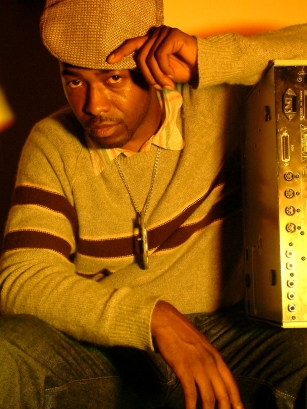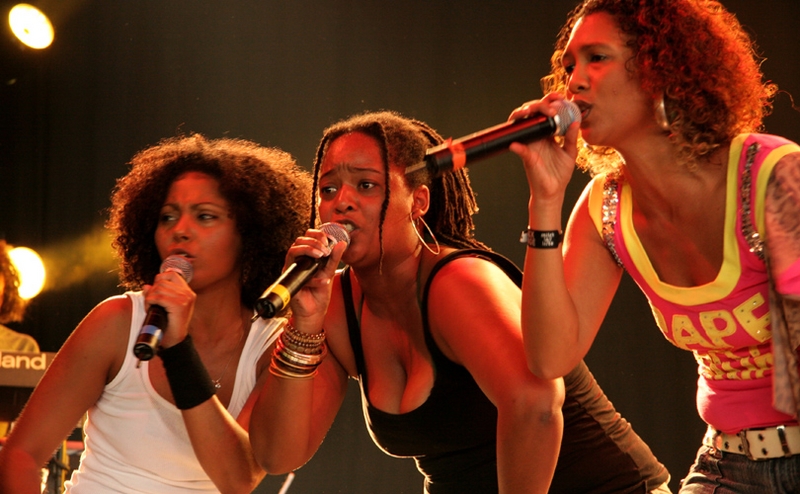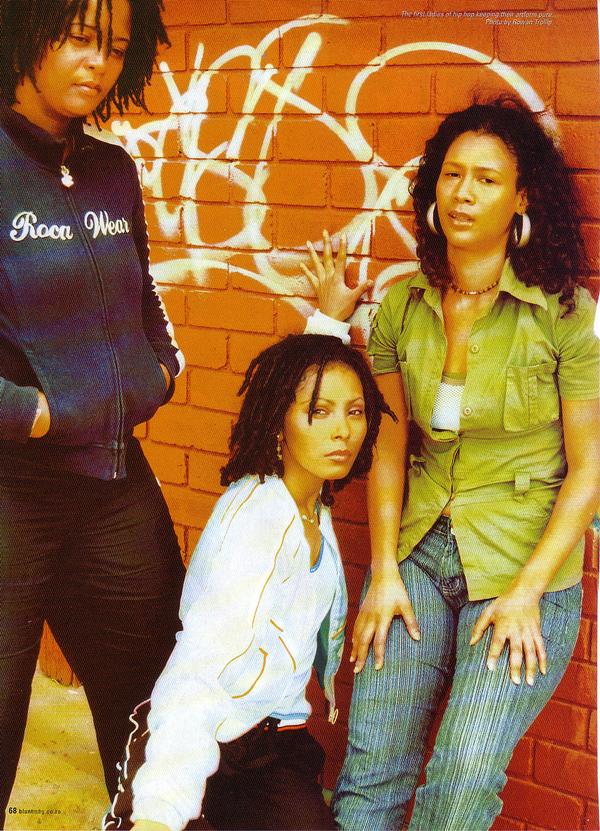TA’RAACH feat. JOY JONES / “Liberation’s Lullabye”
I’m going to keep this post short and sweet, like this week’s feature track.
Recently, I heard a mixtape by a friend of a friend that included one song I just had to get my hands on. I didn’t know the title or the artist, but it was a sweet voice floating over hard drums and, as always, that’s more than enough for me. After emailing back and forth, I finally got the artist and title and then tracked down the CD. 
The tune is “Liberation’s Lullabye” by Detroit MC/producer Ta’Raach (pronounced ‘tuh-ROCK’) and a female vocalist named Joy Jones. If anybody knows more about Joy – mainly, whether or not she’s recorded anything else – hit the comments button and let me, and everybody else, know.
The rest of the album isn’t all that good or all that bad – to my ears, it’s standard issue underground hip-hop – so I won’t feature any more tracks from it. Instead I’ll hit you with some of my favorite songs in the same vein as “Liberation’s Lullabye”: records featuring sweet voices, positive sentiments and beats that knock. Hard.
Get your sweet-voiced, positive-themed, hard-knocking R&B tracks here:
• Ta’Raach & The Lovelution feat. Joy Jones – “Liberation’s Lullabye” – From The Fevers (Sound In Color, 2006)
• Jill Scott – “Try” – From Who Is Jill Scott? (Hidden Beach, 2000)
• Goapele – “Closer” – From Even Closer (Skyblaze/Columbia, 2004)
• India Arie – “Butterfly” – From Red Star Sounds, Vol. 1 (Epic/Redstar, 2001)
And just for a little bit of the old school flavor – the first time I heard hip-hop drums mixed with female R&B vocals was…
• Soul II Soul – “Keep On Movin’ ” – From Club Classics, Vol. 1 (EMI/Ten, 1989)
—Mtume ya Salaam
Capetown too

Female emcees and drums. Yeah, OK, I’m down with that! I’ve been threatening to do some South African music, so in the vein that you’ve lined out, Mtume, here is a trio of tracks from Godessa.
“We are a female hip hop group from South Africa who focuses on social, economic and political issues which directly and indirectly affect our communities as well as our role in the larger global village. ‘Godessa’ comes from two words namely the word Goddess and the word Odessa - the ancient Egyptian City.
“We are young women growing up in a society where glamour is vastly becoming a measure of success. Role models are not women of character like the ancient goddesses or modern leaders from Mother Theresa to Patricia de Lille to Rosa Parks. They are radio and television personalities, models and singers that portray very little that is a reality in our lives. We would like to present an image of success that is not based on scantily clad bodies and make the youth aware of issues that could change their lives. Our lyrics are proudly based on what we have or people we know have experienced.”
I, of course, dig the consciousness of the sisters and how in these crazy times they forward singing about something other than personal pleasure and pretend plenty. (Ya know, blinging and otherwise signifying that we got a little money so we going to act like we got a lot and thereby advertise that having money is the most important etc. etc.—y’all know the drill).
Godessa was founded in February 2000 by Shameema Williams, an activist in Cape Town’s hip hop community. The other two members are Eloise Jones, aka EJ von Lyrik, and Burnadette Amansure, aka Burni.
The first two tracks, “Journey Of Mine” and “Mike Lesson” are from their second album Spillage, which they released in 2004 on their own High Voltage label. The third track, “Black” is a rhyme by Burni.
Look at their pictures, look at their names: seems familiar? The truth of Africa, the truth of Africans worldwide is that as a result of colonialism and imperialism, we are now a creole people, an ethnically and culturally mixed people, and in our creoleness we have a lot in common, especially our “cultural” creoleness. Look, this thing is deeper than skin. Think of all the African countries that contain diverse peoples pushed together and told they are now one. We need to recognize that the modern definition of being African equals being (having to deal with being) mixed. Even if it's a mix of black with black, it's still a creolization, still a mixture.

In an interview Burni described Godessa’s purpose: "As Godessa, we try and focus on social issues from things such as AIDS, globalization, health care, politics and even normal everyday things which affect us. So I think that to a certain extent we are the mouth piece of our communities and therefore we try and be as up to date with our comments."
This is what we need everywhere we are. We need artists relating to the reality of ourselves rather than pushing the fantasy of our commodified desires.
That’s the short and the sweet of what I have to add to the conversation about female emcees over drums.
—Kalamu ya Salaam
Singing vs. rapping
I just have to note that Kalamu might've misunderstood or missed what I was talking about. Check the five tracks I selected and you'll notice it's all singing — there's no rapping at all, not even a hint of it. Soul II Soul started a trend by layering sweet-sounding R&B vocals over drum tracks that sound more like hip-hop than R&B. BUT, Soul II Soul is definitely not a rap group. Neither is Jill Scott, India Arie, Goapele, Jill Jones, etc. etc. They're all R&B singers who sometimes sing over hard drums instead of something that would more commonly be thought of as R&B.
Also, I would rather not say anything bad about Godessa because their hearts are in the right place, but they're rapping leaves a lot to be desired. The biggest problem is their flows are too choppy. They sound like they're stopping and starting (sometimes in the middle of a word) instead of just flowing smooth. Another thing is their style sounds about ten years behind the times. These songs apparently came out in the mid-2000's but they're using rhyme styles that were current in the mid-1990's. That can be kinda cool if someone's doing it on purpose, but I don't get think that's happening here.
—Mtume ya Salaam
Si Senor, I Got It
I was wondering but now I got it and fully understand. I now understand where you were headed with the selections—before your comment above, I didn't catch it even though I couldn't figure out why you were dropping Jill Scott in the mix and I didn't hear any real rapping on the Soul II Soul track, and... but I got it now.
I also understand exactly how you feel about Godessa. I'm listening to what they're saying, you are put off by how they are saying it. I fully understand why I can dig it and why you don't dig it and it all makes sense.
Hey, yall, this week's BoL is an advanced music course. And, of course, we would love for any BoL folk to add their opinons and insights... keep on pushing.
—Kalamu ya Salaam
This entry was posted on Monday, July 14th, 2008 at 12:01 am and is filed under Contemporary. You can follow any responses to this entry through the RSS 2.0 feed. You can leave a response, or trackback from your own site.
2 Responses to “TA’RAACH feat. JOY JONES / “Liberation’s Lullabye””
July 14th, 2008 at 3:49 am
Mtume, you have raised an interesting point: the relationship of words and performance in rapping with regard to the work of the South African female rappers. I am no authority on rappers or rapping. There’s rap material that I like and there’s that I find morally objectionable. I did a bit of checking into Nas after he denounced Jesse Jackson as Old School and irrelevant. I found his aggressive attitude insulting. I wonder how widespread his attitude is within the so-called hip-hop community.
A brother in his mid-30s shared some Nas lyrics with me that he thought were near poetry:
Wake up! Black zombies in a spell for more than fo’-hundred years
Ghetto niggaz won’t have it no mo’, can I get a witness?
Why listen to somebody else tell you how to do it
when you can do it yourself; it’s all in you, do it, do it
Do it niggaz.
I pointed out to him the four lines above and he thought my objection was the use of "niggaz." Well, I do find the use of it, especially the unconscious and inappropriate use of it among teenagers, objectionable.
The two middle lines "Why listen to somebody else tell you how to do it when you can do it yourself; it’s all in you, do it, do it." I thought that view was the gist of stupidity. In further discussions with the same brother, I got the impression that lovers of Nas and other such rappers hold in their hearts a real generational hatred and disrespect. Their sense of community seems narrow and restricted.
That view was deepened with my working with teenagers in high school who listened to a great mix of rappers. One asked me was I a "G." Another showed me a rap performance in which money was glorified. Quite a few were drug users. Another walked into class, saying to his peers, "Mr. Lewis, he my Nigga." There were other ugly incidents I observed. I got a sense that these kids were being programmed by ugly words and attitudes from rappers that they listened to, constantly, programmed with words that held views and perspectives far from those of their parents.
I suppose technical virtuosity is important and emotionally stimulating. I like what the African sisters were doing. I’ve checked out a few African rappers from different countries. I found them more interesting than what the well-known Americans were doing. These Africans I liked their content and their use of their native rhythms.
The foul language, the attitudes that I am encountering as manifested in teenagers who have been weaned on the American pied pipers of destruction troubles me. Are you familiar with the new publication, “Why Hip-Hop Can’t Save Black America” by John McWhorter?—Rudy
Mtume says
I would say that Nas’ "aggressive and insulting" attitude is very widespread in the mainstream hip-hop world. It’s probably the norm.
Hip-hop lyrics are not poetry. Hip-hop lyrics are hip-hop lyrics. They aren’t meant to stand on their own or to be significant, meaningful or even particularly understandable when written on paper (or computer screens) and then read back to one’s self. Because I’m not familiar with the record Nas’ words come from, when I read the words, they mean nothing to me. It’s just words. Words in hip-hop are like drum beats. It’s like you showed me a transcription of a few bars of drumming and asked me what I think about the song. I have no idea. But the concept of young people wanting to forge their own way in the world is a common one throughout literature, cinema and music. Often, we also eventually learn that going one’s own way is a mistake. But it’s a common theme in art. It’s not the smartest way to go, certainly, but it’s a fairly large exaggeration to call such an attitude "the gist of stupidity." I’m sure I could find things much more stupid than that, maybe even in the same song.
Yes, most rappers’ idea of community is very restricted and narrow. That’s true and sad. But it’s also true for a lot of young people in general. That doesn’t have much to be with rap, specifically. It’s a societal problem.
About the class you worked in where teenagers were listening to rap music glorifying gangsterism, drug use and money. I’m a little concerned that you’re living in a bubble, Rudy. What they were listening to is mainstream rap music. Those are the three main topics of the music. If you throw in domination of women, you’ve covered something like 90% of every rap song you’ll ever hear on the radio. But I have to say, I don’t think the kids are being programmed by anything they’re hearing in the songs. The songs don’t create our ignorance; the songs reflect our ignorance. They also reflect the attitude of the powers that be in the music industry. Before rap was a powerfully popular medium, one could be a commercially successful rapper no matter how hard or soft, or "real" or fake, or rich or broke, or whatever. You only see this rush to the darkness, so to speak, post-Dr. Dre’s The Chronic. That album changed the overall tenor of mainstream rap – maybe for good. Why? Because "real G music" became sellable, marketable and easy to duplicate, especially to middle and upper class kids. Why is that important? Because middle and upper class kids have more disposable income. So now, record companies had an easy way to move their product. Just record some dumb, ignorant shit about how much guns, money, cars and/or sex some big, mean-looking black guy has and middle class kids will fork over the cash. It’s like magic! Hence, modern rap. I’m still having a hard time understanding how any of this could be a surprise to you though. It’s been going on for well over a decade now.
I think it’s cool if you like African hip-hop. It’s hard for me though, because I’m a fan of the genre of music itself. You’re not listening to to hip-hop from the standpoint of actually liking hip-hop as a genre of music, so their deficencies as rappers don’t bother you. Nothing wrong with that. It’s the reason I can jam off of Bob James (fake jazz) and John Coltrane (real jazz). I’m not a fan of the genre – I just like what I like. As you said, when you’re listening to African hip-hop, you’re responding to the positive attitudes and the unusual (from an American perspective) instrumentation. (Although I have to say, I heard none of the latter on the Godessa. It actually sounded like common American-sounding instrumentation, except relatively poorly done.) If you enjoy it, I say keep listening to it. Nothing wrong with that.
"The American pied pipers of destruction?" Wow, Rudy. That’s a serious phrase. These dudes are rappers. They recite rhymes for a living. Pied pipers of destruction? Are we talking about the same people? If so, I think you’re giving them way too much credit.
And lastly, I have not read the John McWhorter piece, but if you send it to me, I’d be happy to remedy that oversight.
Later, Rudy! Thanks for the thought provoking comments, as always.
July 16th, 2008 at 1:17 pm
Thanks Mtume, for your measured response. I just received the e-drum link for the “African Underground: Democracy in Dakar” http://nomadicwax.com/film/democracy-in-dakar/
I really think what these guys are doing in a Muslim country is wonderful. I have been watching and listening to them for over an hour. They may not have the technique but I am amazed at the words and the consciousness they put into their rap lyrics One guy says hip hop got to be about more than the money. Maybe they are twenty years behind in technique but they may be twenty years ahead in political consciousness. That’s what is important to me. I wish the kids I work with in high school were where these Senegalese kids are. I wish they had their ethics and their restraint in their raps.
Whether it is Nas downing the old or Brat calling on her “bitches” it is these types of rappers or those worst (trying to get a name for themselves) that tend to attract the attention of the more sagging, hooded teenagers in high school. Maybe it is partially the fault of adults (parents and principals) with their lax attitudes that I should blame rather than the rappers themselves.
Maybe pied pipers of destruction is over the top, but I can find little in the culture of hip hop that’s comforting and reassuring that our kids will be the better for it. For me most of it from the kids’ point of view it is a promotion of drug use, loose sexual morality, and street success, that is, gang life. Maybe among middle-class kids it can be viewed as fantasy. But for poor kids it is the reality of their lives, a pathway to dropping out of school and then a short distance to jails and prisons.
From the interview with Comrade X in Louis Reyes Rivera’s “Bandana Republic” that such contrariness among youth did not begin with hip hop, that such youth rebellion is as old as black urban life and poverty. But, according to Ted Wilson so-called gangsta rap changed the whole gang mentality among kids and with the new digital technologies available to teenagers the monitoring of parents of their children’s musical diet has become almost impossibility in that their kids are more hipped to the technology than their parents. So they are more capable of living secret lives, of having role models who are indeed extremely dangerous.
In any case, you might want to check out “Bandana Republic.” My intent is to turn my ChickenBones audience onto Dakar Rap—Rudy
Leave a Reply
| top |